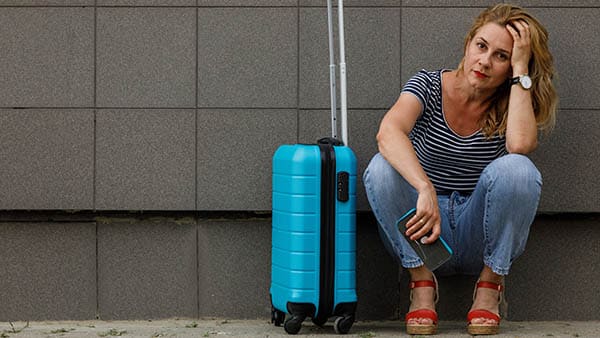6 Travel Tips if You’re Experiencing OAB
April 26, 2024

As many as 40% of women and 30% of men experience overactive bladder (OAB), the sudden urge to urinate that is difficult to control. Take this symptom quiz to see if this includes you. During travel, when bathrooms may be hard to locate, a little advanced planning can go (and go and go) a long way to avoiding OAB mishaps.
OAB doesn’t care if you’re traveling the U.S. or an exotic land, the bladder speaks just one language. Here are six tips to help you get to the bathroom on time.
- Know the rest stops. If it’s a road trip you’re taking, review the route ahead of time and determine the length between rest stops. This will help manage how much to drink between stops and during meals. A restroom locator app is a big help regardless of your destination.
- Strengthen your bladder. In the weeks leading to your departure date, limit urination to scheduled times of day, and not every time you have the urge to go. Doing so will help condition your bladder to hold off until the next scheduled pee break. Kegel exercises (pelvic-squeezing exercises) for men and women are recommended to strengthen your bladder muscles.
- Watch what you drink and eat. You may know that coffee and carbonated drinks can make OAB worse. Some foods can aggravate OAB too. Citrus fruits, tomatoes, and spicy foods are among potential triggers; also foods high in liquid (like cucumbers and watermelon). Avoid these triggers before and during your trip.
- Consider a prescription. Your doctor can prescribe medications that can help control your need to pee. For women, estrogen creams or tablets may provide relief.
- Pack accordingly. Play it safe by packing clothes that are simple to get off. And bring a day bag with absorbent liners, medications, and extra underwear.
- Talk to a urologist. If you’ve never talked to a urologist about OAB, call for an appointment before your trip. It isn’t something you have to live with for the rest of your life. Ask about your treatment options. Sometimes OAB signals other conditions, such as urinary tract infections, bladder stones, diabetes, and kidney disease.
Don’t let an overactive bladder keep you at home. The specialists at MidLantic Urology are dedicated to finding a solution that’s right for you.

